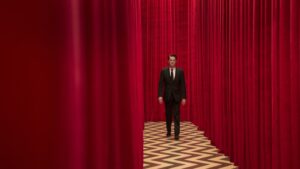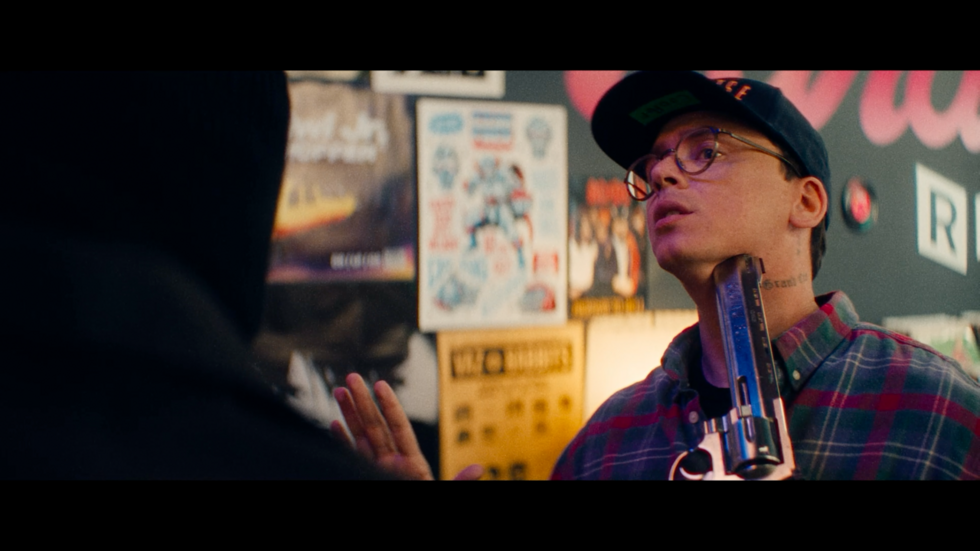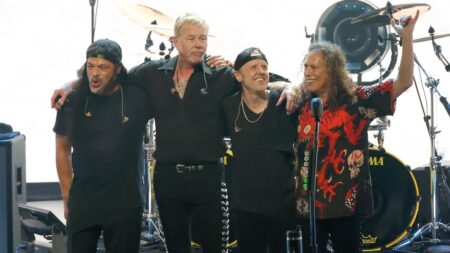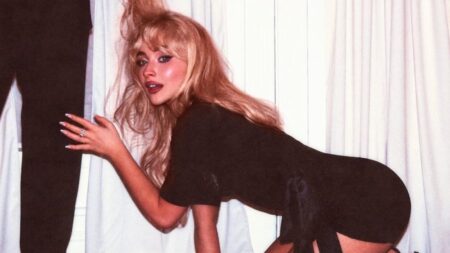“I’m not being boujee, but they have to do this while we’re talking,” Logic says as a crew of makeup artists encircle him, powdering his face as we chat.
“It’s okay,” I assure him. “You’re in Hollywood now!”
“I know…it’s crazy.”
We’re not literally in Hollywood but at the Getty Portrait Studios at New York’s Tribeca Film Festival, where the rapper, born Sir Robert Bryson Hall II, is premiering his directorial debut “Paradise Records.” He’s still adjusting to the whirlwind of the film industry, a world far removed from the rapper’s lifestyle that defined his rise — one that earned him multiple award-winning, critically acclaimed albums before he announced his “retirement” in 2021. Music doesn’t fuel him creatively in the way it once did, and now he’s going all-in on his one true love: film.
“I am in love with cinema,” he says. “I wake up every single day and before I open my eyelids, film is projected on the back of my eyes.”
Even for someone with as much success and bold-faced connections as Logic, though, making the the career leap was far from easy. When he shopped his script to Hollywood studios, he received resounding rejections from every executive.
“Everybody said no which makes sense,” he says. “Imagine you’re a studio head, and I say, ‘Hey, I want to make a movie, and I want to write the script, and I want to act, even though I’ve never acted or written a script, and I want to direct it even though I’ve never directed, and I want to cast my best friend who’s never acted, and I want full creative control and final cut, and I want you to pay.’”
So, he decided to independently produce the film and spend “millions and millions” of his own money to fund the project. Enlisting Kevin Smith as a producer was the breakthrough that pushed the film into production.
“I slid in his DMS. I was like, ‘Hey, boo,’” Logic says of how he and Smith came together. “And then we became friends and he’s such a dear. He’s like my brother now, we’re family. He believed in me and he pushed me to make this movie.”
Getty Images
If Logic feels at all like an imposter in Hollywood, his love for the craft is apparent by his sprawling knowledge of the industry. “I’m a big film nerd,” he says.
Much of our 10-minute conversation consists of him rattling off names of his favorite directors and writers. Quentin Tarantino, David Fincher, Spike Jonze, Spike Lee and Charlie Kaufman are a small handful of his heroes. Of course, Smith is also one of Logic’s main muses, whose 1994 film “Clerks” served as an undeniable blueprint for “Paradise Records.”
In the 106-minute comedy, Logic plays the gregarious, weed-smoking Cooper, a record store owner who owes the bank $100,000 and whose shop is facing foreclosure. The film follows him and and his motley crew — an eclectic group of characters including a dopey weed dealer named Slaydras (Tony Revolori) and a statuesque drag queen (Tajh Jordan) — as they face a run of bad luck, including a robbery. At one point, the record store is used as a hideout by robbers who take the staff hostage — a direct nod to “Clerks,” which features a similar hostage scene in a convenience store.
Ahead of the premiere of “Paradise Records” at Tribeca Film Festival, Variety spoke to Logic about getting advice from J.J Abrams for his directorial debut, independently producing the film after getting rejected from Hollywood and his grand writing and directing plans (he has dozens of scripts in the works):
Where did the idea for ‘Paradise Records’ come from?
I just wrote everything from personal experience. When it comes to my whole team, I feel like Captain Planet because I’m just surrounded by color and culture and I wanted to put it on screen in a way that I hadn’t seen. Sometimes you can feel a little forced, and we know when it feels forced and I didn’t want that at all. The biggest thing for me, especially because it’s a comedy, was making sure that the jokes aren’t funny because she’s gay or he’s black. They’re never the butt of the joke. It’s funny because it’s a stereotype placed through the lens of a very ignorant person and then learning.
Was there any specific experience you had in the industry that inspired the story?
Honestly, it really just came down to conversations between me and my friends. I think the reason why I take pride in my dialogue is because if somebody says anything that’s funny or remotely weird or different, I write it down and I would show you, but I don’t have my phone, and I literally have thousands and thousands of lines, of just lines, about the most random shit and any time I can put that on the page, I do.
What was the biggest challenge or surprise taking on a role as director for the first time?
Honestly, I think it was the tone. Especially the last few years, we’ve been in a state where a lot of people can find things touchy or taboo to talk about. But I’m like, ‘Fuck that.’ I think when it comes to art, an artist should be able to talk about whatever they want, and that nothing is off limits. It’s just about change. So I was very proud when Kevin was able to edit this with my pure intent of peace, love, positivity and inclusion. But not inclusion for the sake of trying to seem any way, but just my authentic and honest self.
How did you and Kevin meet, and come together for this?
I slid in his DMS. I was like, ‘Hey, boo.’ And then we became friends and he’s such a dear. He’s like my brother now, we’re family. He believed in me and he pushed me to make this movie, and I spent millions and millions of dollars to do it because I believed in myself in Hollywood. And everybody said no, which makes sense. Imagine you’re a studio head, and I say, ‘Hey, I want to make a movie, and I want to write the script, and I want to act, even though I’ve never acted or written a script, and I want to direct it even though I’ve never directed, and I want to cast my best friend who’s never acted, and I want full creative control and final cut, and I want you to pay.
Who are some of your favorite filmmakers and films that inspired you during this process?
My goodness, Tarantino, David Fincher, Spike Jonze. And I just absolutely love Charlie Kaufman. He’s one of my favorite writers. He did ‘Adaptation’ and ‘Being John Malkovich.’ I’m a big film nerd.
How did this work seep into ‘Paradise Records’?
It’s dialogue. Everything is dialogue. Natural conversations. And especially in this film, I wrote about shit I was scared to say. Everybody says it. Everybody talks this way, and everybody has said some loud shit at one time or another, even if they were just joking. And I was like, ‘No, I want to actually do it on film and show the psychological reasoning behind it, and the intent behind specific characters.’
There’s character in this movie who’s the biggest piece of shit ever, and I basically just got to have my Eddie Murphy moment. I play this 80 year-old dude who’s a womanizing, chauvinistic asshole and if you hate him, that means I did a good job. Especially highlighting his ignorance.
Did you take acting classes?
I did hire an acting coach, and we did one session. Her name is Jessica Simmer, and she’s the shit. And after our first session, she was like, ‘You don’t need me. You’re gonna be fine.’ So I had her work with my best friend and she helped.
Who did you turn to for advice before your first day on set as director?
I called a lot of people and one of the people that I called was J.J Abrams, and he was like, ‘Number one: have fun.’ And then he just gave me an insane amount of advice. But he was like, ‘It’s all problem solving. You know, that’s all film really is. And it takes a village.’
What are your goals within the film industry?
I want to write and direct. I absolutely love cinema. I wake up every single day and before I open my eyelids, film is projected on the back of my eyes. I love this so much. I’ll still make music. But the difference is, I’m not in love with music like I used to be when I was younger. I am in love with cinema. And I think about it. It’s all I do. I constantly write scripts, think of shots, call different homies who just so happen to be actors. That’s what I want to do.
How many scripts do you have?
Oh, dude, you have no idea. My next film is basically like if Spike Jonze created like ‘Adaptation’ and then like ‘Friday,’ like, Ice Cube. It’s like ‘Vanilla Sky.’ It’s fucking crazy. That’s what it. It is a cinematic love letter to filmmaking from a different perspective, in a new voice.
How much money did you spend on ‘Paradise Records?’
You can quote me on millions and millions. That’s how much I believed in myself.
Read the full article here








